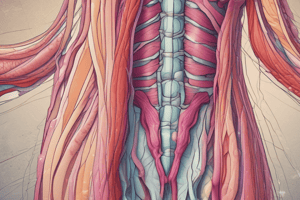Podcast
Questions and Answers
What is the main structural difference between skeletal muscle fibers and other types of muscle cells?
What is the main structural difference between skeletal muscle fibers and other types of muscle cells?
- Location within the body
- Presence of striations
- Number of nuclei within each cell (correct)
- Size and shape of the cells
What are the contractile proteins found in muscle tissue?
What are the contractile proteins found in muscle tissue?
- Actin and myosin (correct)
- Keratin and collagen
- Hemoglobin and myoglobin
- Insulin and glucagon
What is the main function of muscle tissue in the vertebrate body?
What is the main function of muscle tissue in the vertebrate body?
- To store energy for future use
- To allow the body to move its limbs and pump blood (correct)
- To aid in digestion and nutrient absorption
- To provide structural support to the body
How are skeletal muscle fibers arranged under the microscope?
How are skeletal muscle fibers arranged under the microscope?
What is the primary characteristic of muscle cells or fibers?
What is the primary characteristic of muscle cells or fibers?
In which type of tissues are muscle cells or fibers usually arranged?
In which type of tissues are muscle cells or fibers usually arranged?
What is the primary function of skeletal muscle?
What is the primary function of skeletal muscle?
Which type of muscle tissue has intercalated disks and is responsible for the heartbeat?
Which type of muscle tissue has intercalated disks and is responsible for the heartbeat?
What is a characteristic of smooth muscle tissue?
What is a characteristic of smooth muscle tissue?
What type of muscle tissue is found in the walls of the viscera such as the stomach, small intestines, and blood vessels?
What type of muscle tissue is found in the walls of the viscera such as the stomach, small intestines, and blood vessels?
Which type of muscle tissue is under voluntary control?
Which type of muscle tissue is under voluntary control?
What characteristic distinguishes cardiac muscle fibers from other types of muscle cells?
What characteristic distinguishes cardiac muscle fibers from other types of muscle cells?
Which type of muscle tissue contracts more slowly than skeletal muscle?
Which type of muscle tissue contracts more slowly than skeletal muscle?
What unique feature allows impulses to move freely between cardiac muscle cells?
What unique feature allows impulses to move freely between cardiac muscle cells?
Where is smooth muscle tissue mainly found in the human body?
Where is smooth muscle tissue mainly found in the human body?
What characteristic allows skeletal muscles to contract?
What characteristic allows skeletal muscles to contract?
Flashcards are hidden until you start studying
Study Notes
Structural Differences of Muscle Fibers
- Skeletal muscle fibers are multinucleated, while cardiac and smooth muscle cells are typically uninucleated.
- Skeletal muscle has a striated appearance due to organized sarcomeres, unlike the non-striated appearance of smooth muscle.
Contractile Proteins in Muscle Tissue
- Key contractile proteins include actin and myosin, crucial for muscle contraction across all muscle types.
Main Function of Muscle Tissue
- Muscle tissue primarily facilitates movement in the vertebrate body, enabling locomotion and the functioning of organ systems.
Arrangement of Skeletal Muscle Under the Microscope
- Skeletal muscle fibers exhibit a striated pattern, with alternating dark and light bands due to the arrangement of proteins.
Primary Characteristic of Muscle Cells
- Muscle cells or fibers are excitable, meaning they can respond to stimuli and generate action potentials.
Arrangement of Muscle Cells or Fibers
- Muscle fibers are typically arranged in bundles (fascicles) within skeleton muscles and layered in sheets in smooth muscle.
Primary Function of Skeletal Muscle
- Skeletal muscle is primarily responsible for voluntary movements, enabling interactions with the environment and posture maintenance.
Cardiac Muscle Tissue
- Cardiac muscle, with intercalated discs, is specialized for heart function and is involuntary, responsible for the heartbeat.
Characteristics of Smooth Muscle Tissue
- Smooth muscle tissue is non-striated and involuntary, regulating internal processes such as digestion and blood flow.
Location of Smooth Muscle Tissue
- Found in the walls of viscera, including the stomach, small intestines, and blood vessels, smooth muscle allows for involuntary control of organ function.
Voluntary Control of Muscle Tissue
- Skeletal muscle tissue operates under voluntary control, allowing for conscious movement and action.
Distinctions of Cardiac Muscle Fibers
- Cardiac muscle fibers contain specialized junctions (intercalated discs) that facilitate rapid impulse transmission between cells.
Contraction Speed of Muscle Types
- Smooth muscle tissue contracts more slowly than skeletal muscle, sustaining contractions over longer periods.
Impulse Movement in Cardiac Muscle Cells
- Unique gap junctions in cardiac muscle tissue enable free movement of ions and electrical impulses, coordinating heartbeats.
Locations of Smooth Muscle Tissue in the Body
- Mainly found in hollow organs including the gastrointestinal tract, blood vessels, and bladder.
Contraction Mechanism of Skeletal Muscles
- The ability of skeletal muscles to contract is facilitated by the sliding filament model, where actin and myosin filaments slide past each other during contraction.
Studying That Suits You
Use AI to generate personalized quizzes and flashcards to suit your learning preferences.




